|
|
|
Sort Order |
|
|
|
Items / Page
|
|
|
|
|
|
|
| Srl | Item |
| 1 |
ID:
154857
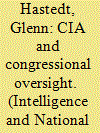

|
|
|
|
|
| Summary/Abstract |
Organizations both learn lessons and forget lessons. A lesson said to be learned by the CIA as a result of the negative reaction of congressional overseers to its interrogation program was the need to create opportunities to provide information and interact with them. The historical record shows that this was a lesson already learned. Why then the need to relearn it? It is suggested here that organizational forgetfulness may be triggered by the same factors which promote learning: perceived problems with organizational performance, opportunities to act, and people.
|
|
|
|
|
|
|
|
|
|
|
|
|
|
|
|
| 2 |
ID:
154866
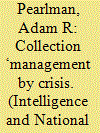

|
|
|
|
|
| Summary/Abstract |
This article examines human intelligence collection in wartime, and offers a methodology to help determine the relative success or failure of the detainee interrogation mission at Guantanamo Bay, Cuba (GTMO). It surveys the relevant background on GTMO, a brief history on interrogations during World War II and Vietnam, and draws comparisons among them to be considered in potential future mass-interrogation missions. Drawing from documentary research and two dozen original interviews, it argues that, to the extent an intelligence mission was one of the purposes of transferring detainees to GTMO, the relevant metric of success is whether collectors were able to obtain more or ‘better’ intelligence from the detainees than they would have been able to in-theater. At the strategic level, then, GTMO’s value to intelligence collectors is to be assessed at the margins, rather than the absolute value of the information educed.
|
|
|
|
|
|
|
|
|
|
|
|
|
|
|
|
| 3 |
ID:
154860
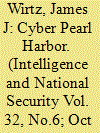

|
|
|
|
|
| Summary/Abstract |
The article describes the incentives that would motivate an opponent to incorporate a surprise cyber attack into a conventional operation to defeat US deterrent strategies by presenting the United States with a fait accompli. In describing this ‘Cyber Pearl Harbor’, the article explores the organizational and intelligence constraints that make it difficult to respond to the prospect of a combined cyber surprise attack and conventional operation. The article suggests that a cyber surprise attack will not occur in a political or strategic vacuum. Instead, weak opponents will use it to achieve objectives that could not be attained if US and allied forces were fully alerted.
|
|
|
|
|
|
|
|
|
|
|
|
|
|
|
|
| 4 |
ID:
154861


|
|
|
|
|
| Summary/Abstract |
This article examines the requirements for high and very high resolution photography of the USSR and other denied areas during the Cold War. It discusses the partial success of GAMBIT-1 and the much greater success of GAMBIT-3 beginning in 1966 in acquiring the former. The article reviews the development of the Manned Orbiting Laboratory (MOL) in the same period to collect very high resolution photography, the rationale for it, and the major technical and financial problems the program soon experienced. It then describes the debate beginning in 1968 over the value of this imagery considering the MOL’s costs and the growing success of GAMBIT-3, and these and the other factors that led President Richard Nixon to cancel the program the following year.
|
|
|
|
|
|
|
|
|
|
|
|
|
|
|
|
| 5 |
ID:
154864
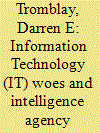

|
|
|
|
|
| Summary/Abstract |
The Federal Bureau of Investigation has experienced a number of high-profile failures – across nearly four decades – in developing its Information Technology (IT) infrastructure. Repeated missteps are indications of problems with the Bureau’s broader culture that degrade its effectiveness across missions. A significant factor contributing to this dysfunctional culture is the diversification of the FBI’s responsibilities, to the point of losing a corporate identity. Reform will require an assessment of the Bureau’s purpose, the elements which it should retain in furtherance of this vision, and the steps to align its workforce with the competencies necessary to pursue this mission.
|
|
|
|
|
|
|
|
|
|
|
|
|
|
|
|
| 6 |
ID:
154862


|
|
|
|
|
| Summary/Abstract |
This article reconstructs the CIA’s exploitation of the Natsional’no Trudovoi Soyuz, a right-wing Russian nationalist organization, as a part of ‘rollback’ and ‘stay-behind’ covert operations against the Soviet Union during the 1950s. Operations such as these relied on the notion that far-right nationalism presented a potent counter to international communism. The article explores postwar ties between American intelligence and the NTS in a shared effort to ‘roll back’ the borders of communism. It likewise discusses the ability of Soviet counterintelligence to intercept, penetrate, and sabotage nationalist networks and their operations backed by Western governments.
|
|
|
|
|
|
|
|
|
|
|
|
|
|
|
|
| 7 |
ID:
154863


|
|
|
|
|
| Summary/Abstract |
From 1946–1963, MI5 operated a South-East Asian regional headquarters in Singapore: Security Intelligence Far East (SIFE). This article responds to growing interest in theatre-level intelligence organisation and the importance of intelligence to Britain’s Cold War and decolonisation by examining the performance of SIFE. On the organisational level, SIFE was strongest when it remained wedded to its charter functions and closely adhered to the priorities of its principal consumer: the Commissioner-General for South-East Asia. Its assessments were influential in shaping decision-makers’ understandings of key regional developments, although this did not always translate into public policy. Lastly, SIFE enjoyed success in developing lasting liaison relationships to cement British influence, but failed to utilise these to improve its intake of raw intelligence.
|
|
|
|
|
|
|
|
|
|
|
|
|
|
|
|
| 8 |
ID:
154856
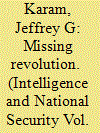

|
|
|
|
|
| Summary/Abstract |
Why were American officials caught by surprise with the military coup and later revolution in Iraq on 14 July 1958? Drawing on American intelligence and diplomatic records as well as multilingual sources, this article argues that the US intelligence failure is the product of two factors: the collection of information from too few and too similar human sources of intelligence in Iraq’s ruling regime, and the unreceptivity of US officials to assessing new information and their unwillingness to update assessments of local Iraqi developments. It revisits America’s intelligence failure in Iraq and suggests important lessons for the study of intelligence.
|
|
|
|
|
|
|
|
|
|
|
|
|
|
|
|
| 9 |
ID:
154859


|
|
|
|
|
| Summary/Abstract |
The press was outraged in the 1970s when investigations exposed the CIA’s use of American journalists as undercover informants during the Cold War. This was treated as a shocking break in the traditional line between journalism and government. A study of journalist Carl W. Ackerman’s activities in the Great War, however, reveals such cooperation had precedents. While reporting oversees, Ackerman, later dean of Columbia Journalism School, worked behind the scenes with officials to shape and promote the Wilson administration’s foreign policy. This paper is a first step to understanding that pervasive, close relationships between journalists and government were well established at the beginning of the twentieth century.
|
|
|
|
|
|
|
|
|
|
|
|
|
|
|
|
| 10 |
ID:
154865


|
|
|
|
|
| Summary/Abstract |
During World War I, Germany sought to provoke numerous insurrections throughout the British and French Empires. Examining the influence of signals intelligence within one of these colonial settings provides an opportunity to measure the operational importance of wartime cryptanalysis. Through a careful analysis of the original intercepts, this article reconstructs the responses of Room 40, the Admiralty’s cryptology department, to Germany’s Moroccan intrigues and highlights the development of intelligence practices. It argues that strategies to deploy diplomatic intelligence emerged gradually, but that Germany’s enduring support for Moroccan dissidents suggests diplomatic cryptanalysis only secured modest results within an operational context.
|
|
|
|
|
|
|
|
|
|
|
|
|
|
|
|
| 11 |
ID:
154855


|
|
|
|
|
| Summary/Abstract |
This article investigates the Thatcher government’s attempts to suppress or censor reporting on secret intelligence issues in the early 1980s. It examines official reactions to a BBC intrusion into the secret world, as the long-running Panorama documentary strand analysed the role and accountability of Britain’s clandestine services. It also assesses the extent of collusion between the government and the BBC’s senior management. The Panorama affair was an important waypoint on the journey towards the dramatic Spycatcher episode of the mid-1980s. The key players on the government side – Thatcher and Cabinet Secretary Robert Armstrong – failed to learn the lessons of the 1980–81 affair, that it was often more dangerous to attempt suppression than to simply let events run their course.
|
|
|
|
|
|
|
|
|
|
|
|
|
|
|
|
| 12 |
ID:
154858
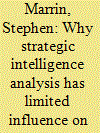

|
|
|
|
|
| Summary/Abstract |
Why does strategic intelligence analysis have limited influence on American foreign policy? Intelligence analysis is frequently disregarded, this paper contends, because it is a duplicated step in the decision-making process and supplements but does not supplant policy assessment. Many intelligence analyses will confirm policy assessments and be redundant or – if the assessments are different – policy-makers will choose their own interpretations over those of intelligence analysts. The findings of this paper provide scholars with important insights into the limits of intelligence analysis in the foreign policy process as well as recommendations for increasing its positive impact on policy.Why does strategic intelligence analysis have limited influence on American foreign policy? Intelligence analysis is frequently disregarded, this paper contends, because it is a duplicated step in the decision-making process and supplements but does not supplant policy assessment. Many intelligence analyses will confirm policy assessments and be redundant or – if the assessments are different – policy-makers will choose their own interpretations over those of intelligence analysts. The findings of this paper provide scholars with important insights into the limits of intelligence analysis in the foreign policy process as well as recommendations for increasing its positive impact on policy.
|
|
|
|
|
|
|
|
|
|
|
|
|
|
|
|
|
|
|
|
|